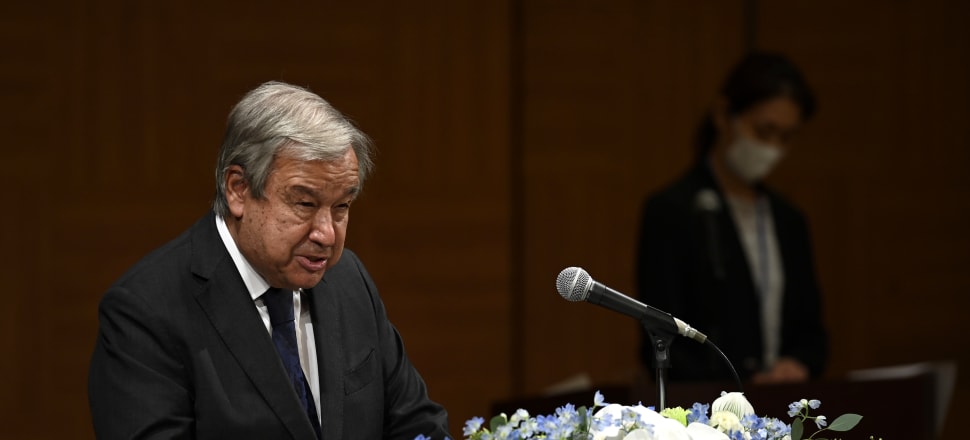
As the United Nations hosts the latest talks on the nuclear Non-Proliferation Treaty, Carolina Panico writes that language of ‘nuclear politics’ needs a reality check
Comment: In the words of the UN Secretary-General, Antonio Guterres, “Humanity is just one misunderstanding, one miscalculation away from nuclear annihilation,” and yet nuclear-armed states continue to support the logic of deterrence and the supposed security assurances provided by possessing nuclear weapons.
This month sees the Tenth Review Conference of the Non-Proliferation Treaty (NPT) at the United Nations in New York.
Pro-disarmament states and civil society continue to push for more concrete measures toward a world free of nuclear weapons.
Considered the cornerstone of the international security architecture, the treaty is founded on three main pillars: non-proliferation, peaceful use of nuclear technology and disarmament.
While the treaty is often acknowledged as a successful feature of international law and global governance for its robust non-proliferation norm, disarmament measures have been less straightforward.
We certainly have fewer nuclear weapons than we did during the Cold War; however, there are still around 13,000 nuclear weapons out there, and it would seem nuclear-armed states are not ready to get rid of them anytime soon.
My argument is that the treaty provides nuclear states with the norms of language that gloss over the nature of nuclear possession. The treaty disarmament principle, often, if not always, acknowledged in the statements addressing the nuclear issue, enables the nuclear-armed states to present themselves as less violent and more responsible, thereby rendering the continuing possession and modernisation of nuclear arsenals more acceptable.
As the New Zealand Minister for Disarmament and Arms Control, Phil Twyford, said at the conference opening session this month: “All nuclear-weapon states have modernisation programmes underway, with billions of dollars invested in plans for the long-term possession of nuclear weapons.”
And as the United Kingdom representative noted, there are ongoing “challenges to international security” described as “a deteriorating global security environment, increased competition and technological disruption”, which apparently justify their reliance on nuclear deterrence for the time being.
As debates continue at the conference, nuclear-armed states continue to reiterate their “responsibility” as nuclear possessors. The United Kingdom, for example, said: “We take our responsibilities as a nuclear weapon state seriously, and are committed to transparency and accountability.”
It also reiterated that it “will continue to play a leading role in disarmament by pioneering verification work, championing transparency and advancing risk reduction”.
While it is reassuring to see nuclear-armed states speaking about their commitment to disarm and acting ‘responsibly’, it’s worth pausing to reflect on what this nuclear responsibility talk really means in the context of the treaty, and how the repetition and reiteration of responsibility can further entrench the bounds and definition of what is acceptable in the sphere of nuclear politics.
The more the treaty's nuclear-armed states talk as if their weapons were part of a ‘nuclear responsible trend’, the more nuclear possession remains accepted as normal.
And while I’m optimistic that the complete elimination of nuclear weapons is in reach, we must challenge the mechanisms rendering nuclear possession an acceptable practice.
Speaking about nuclear weapons in responsible terms does not necessarily mean we are heading toward disarmament. Reiterating responsible behaviour also equips nuclear-armed states with the tools to justify having nuclear weapons in the first place.
The fact that the treaty was created to avert the danger of nuclear war while recognising five states as nuclear weapons states, has instilled a social expectation that these countries will handle nuclear capabilities with the utmost sanity, reason, and moral responsibility.
While I remain positive that multilateral diplomacy is the best way to achieve nuclear disarmament, I argue that we must use opportunities like the treaty review conference to expose the mechanisms making nuclear possession possible, challenging ideas of ‘responsible possession’ while reiterating the importance of the new Treaty on the Prohibition of nuclear weapons TPNW.
The first meeting of state parties to the new TPNW, which seeks to strengthen and complement the NPT, and to which the five NPT nuclear-armed states are not parties, recently took place in Vienna.
Its outcome document, The Vienna Declaration, sends a strong message to those who still defend the logic of deterrence and the false security assurances provided by nuclear weapons.
To the nuclear-armed states, TPNW state parties have one important thing to say: “We will not rest until the last state has joined the Treaty, the last warhead has been dismantled and destroyed, and nuclear weapons have been totally eliminated from the Earth.”
Possessing nuclear weapons is ultimately irresponsible. There should be no space for talking about ‘responsibility’ or ‘moral obligations’ when “behind the veil of good intentions”, as security studies expert Jan Ruzicka wrote, nuclear states continue to work towards modernising and increasing stockpile numbers, edging the world ever closer to that one miscalculation away from annihilation.
This article is based on an article published by Carolina Panico in Contemporary Security Policy







